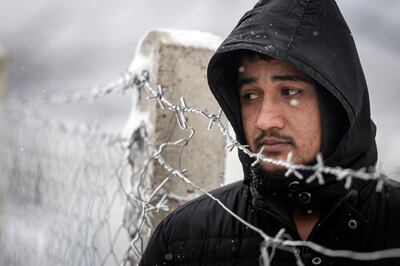The situation for migrants who were left stranded in Bosnia and Herzegovina after their tent camp burnt down has "improved significantly", the UN's International Organisation for Migration (IOM) said on Monday.
But the organisation still holds concerns for up to 1,500 migrants who have not been accommodated inside new heated tents set up weeks after fire destroyed the camp at Lipa, in the north-west of the Balkan country.
Scores of migrants had endured miserable conditions in the freezing cold since late December following the fire. The situation was compounded when local authorities refused to open a nearby centre in Bihac after an outcry from residents, leaving the migrants to sleep in the outdoors.
Peter Van der Auweraert, of the IOM, told The National all 900 migrants still at Lipa were rehoused inside the tents on Monday.
"While the conditions will remain basic, the humanitarian situation of those people has improved significantly," he said.
"They were spending the night outside before, so that’s a very positive development that we have seen. Both in terms of improvement of the humanitarian situation, but also the fact that the state has taken responsibility for this and will be running the camp."
However, he warned a further 1,500 migrants faced grim prospects elsewhere in the country.
"We will continue to provide humanitarian assistance, but in terms of access to shelter, I don’t see a solution around the corner for those people," he added.
On Sunday, refugee rights group Pro Asyl urged the German government to rehome stranded migrants who were still at the fire-ravaged camp.
New figures showed the number of people seeking asylum in Germany in 2020 fell 30 per cent compared with 2019, with closed borders and coronavirus lockdowns blamed for the decrease.
Pro Asyl said the situation in Bosnia was urgent, given the harsh winter weather.
“The current asylum figures show Germany has room,” it said.
The Lipa camp was set up hastily during the summer when Europe tightened border restrictions to curb the spread of the coronavirus.
The camp lacked basic necessities such as water and electricity. Aid agencies pulled out after saying it was unsustainable.
The centre was burnt down by some migrants who were forced to leave, police said. It forced the thousands still living there out into the cold as authorities scrambled to find alternative accommodation.
Officials identified the centre in Bihac as appropriate and began transferring the migrants there on buses, but local authorities refused to take them. The vehicles returned to Lipa and the migrants were forced off.
Mr Van der Auweraert said the issue of the migrants being resettled inside the European Union was complicated as most had already left Greece, an EU member state, before getting stuck at the border of a non-member state.
"Some people in Bosnia and Herzegovina say they should be (resettled in the EU). The question becomes if they take people from Bosnia and Herzegovina, why not from Turkey, why not from Lebanon and Jordan," he said.
"It’s a difficult discussion to have."
Last week, the EU gave €3.5 million ($4.2m) in aid after describing the situation as a "humanitarian disaster".
“Long-term solutions are urgently needed,” EU foreign policy chief Josep Borrell said.
“We urge the authorities not to leave people out in the cold, without access to sanitary facilities in the midst of a global pandemic.”











